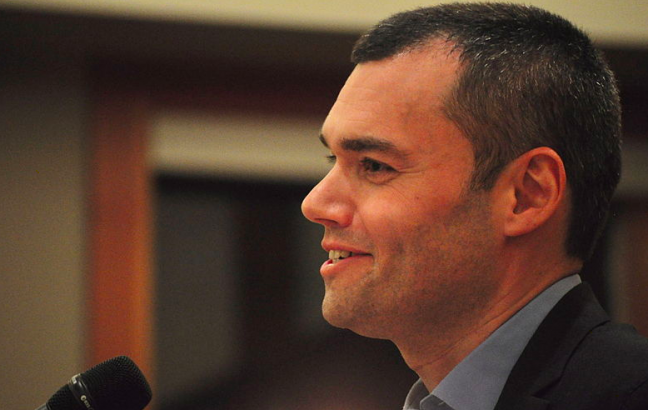Yisrael Medad argues that Peter Beinart’s quoting of Ze’ev Jabotinsky in his recent essay, as in his earlier work, is misleading, being true to neither the original text nor its historical context.
In his Jewish Currents essay, Peter Beinart presents this snippet to sum up the thinking of Ze’ev Jabotinsky on Jewish statehood: ‘As Jabotinsky explained in 1909, “The full pathos of our ideal was never focused on sovereignty, but rather on the idea of a territory, a compact Jewish society in one continuous space . . . not a Jewish state but a Jewish collective life.”’
That excerpt – which he, or one of the three research assistants he employed, found in an article by Dmitry Shumsky – is used to buttress his agreement with Shumsky that ‘the demand for a Jewish state did not define Zionism until the 1940s’. Beinart could have also referred to a 1918 booklet entitled ‘The Jewish Nation’ in which Jabotinsky proposed an administrative government in Palestine, writing, ‘our friends as well as enemies … think that we claim an independent Jewish State – which of course, we do not, and most emphatically not … a “Jewish state” is so premature’.
Without specifically referencing the 1942 decision taken at the Biltmore Hotel Conference, Beinart is suggesting that it was only the Holocaust that tipped the scales, forcing Zionists to pursue statehood rather than other paradigms. He writes: ‘The belief that Jews in the land of Israel risk genocide without a Jewish state is central to what it means to be a Zionist today.’
And he quotes from Jabotinsky’s 1923 ‘Iron Wall’ article: ‘prominent pre-state Zionists themselves depicted Palestinian resistance not as genocidal but as understandable. ‘“Every native population in the world resists colonists as long as it has the slightest hope of being able to rid itself of the danger of being colonized,” wrote the hawkish Jabotinsky in 1923. “That is what the Arabs in Palestine are doing”’.
To make the most obvious point first, Jabotinsky did not reject a Jewish state in principle. He was expressing his judgment that the time was not ripe for a declaration of independence. In the JTA 1940 obituary of Jabotinsky, we read: ‘Addressing a convention of the New Zionist Organization in Prague two years ago, Jabotinsky declared that the whole of Palestine, on both sides of the Jordan, had to become an independent Jewish State which would then decide its future connection with Britain.’
Arguing with Beinart is frustrating because almost every source to which he refers is corrupted by him in the manner of his representation of it. It is either incomplete or lacks the needed contextual background. As Daniel Gordis has observed, Beinart displays such ‘an astonishing array of sleights of hand and misrepresentations’ that the essay is ultimately ‘intellectually dishonest—and manipulative.’
To illustrate the truth of this claim of Beinart’s unreliable method of quotation, consider again the quotation from 1909 cited above at the opening of this article. Jabotinsky’s words are extracted from a seven-part text that ran from mid-January to mid-March 1909. In order to grasp the context, one needs to know where he was when he wrote it and what the pressures on him were. Jabotinsky had been in Constantinople since 1908. The Berlin Executive office of the World Zionist Organization (WZO) had appointed him its agent there, where he became editor-in-chief of a new pro-Young-Turkish daily newspaper La Jeune Turc and other pro-Zionist periodicals including a weekly, L’Aurore, the Ladino El Judeo and a Hebrew weekly, Ha-Mevasser. After several years of struggle, the Young Turks succeeded on 24 July 1908 in forcing Abdul Hamid to restore the constitution. They were nationalists and for all intents and purpose, their rule was nigh martial. In short, any attempt to propagandize in Turkey for an independent Jewish state would have been the end of Zionism in Turkey.
As noted by Tudor Parfitt, Yulia Egorova and Jacob Landau, ‘Regarding Palestine, [Ha-Mevasser] argued that Zionist settlement to Palestine was economically favourable for the development of the Ottoman empire … [and] rebutted claims circulated by other contemporary press outlets (such as Alemdar), which stated that Zionism was anti-Turkish.’
Quite simply, Jabotinsky realized he needed a more pragmatic approach to the ruling clique to advance Jewish settlement in Palestine. The Young Turk leadership was becoming more sympathetic to Zionism. Anyone reading the original Russian would grasp that Jabotinsky, throughout those seven parts of the article, was deliberately avoiding any framing of Zionist aims that could prove disastrous for Zionism in Turkey, while yielding as little as possible on the possible future development of the growing Zionist presence in Palestine, in terms of demography or land ownership.
Another context to Jabotinsky’s 1909 article was the publication of a book by Jacobus Kann about the impressions he had formed during his 1907 visit to Ereẓ Israel. He had sent it to Young Turk parliamentarians and it included a demand for a Jewish autonomous home rule in Eretz Israel. This aroused strong criticism from Jabotinsky, who at the time headed up the Zionist press in Istanbul, as having damaged the cause of Zionism in the Ottoman capital. As described by Lenni Brener, a Trotskyite and no admirer of Jabotinsky, ‘Jabotinsky had orders from [David] Wolffsohn [the President of the WZO] to push a very soft line to the new masters of Turkey: Zionism did not mean a Jewish state, only free immigration to Palestine and cultural autonomy. But suddenly, without warning to either Wolffsohn or the Constantinople office, Jacobus Kann, a banker who administered the finances of the Dutch royal family and a member of the Actions Committee, published a travelogue, in German, of his recent trip to Palestine. In it, he reiterated the traditional Herzlian line that Turkey should set up an autonomous Zionist state there.’
It is clear that, as Evyatar Freizel has found, ‘For tactical reasons, official Zionism was cautious in explaining its ultimate aims, especially when addressing public opinion. Terms other than “state” were used in diverse political documents and official Zionist utterances: Heimstatte, nationale Heimstatte, Jewish national home, commonwealth, Jewish commonwealth. However, the accepted view is that the ultimate aim of the mainstream Zionist movement was to recreate a Jewish state in Palestine. It remained open how best to reach that goal. A widely accepted position supported an evolutionary path, “practical Zionism” meaning a gradual process of economic, social and institutional development.’
Shmuel Katz in Volume One of Lone Wolf (p. 100), describing the affair, quotes Jabotinsky from his Autobiography as ruefully admitting that it was ironic that he, of all people, downplayed the demand for statehood. However, given the time and place, Jabotinsky wrote, despite ‘lov[ing] State Zionism…I love logic more’.
The anti-State Jabotinsky presented by Beinart does not survive a careful review of text and context.
It is not the first time that Beinart has misrepresented Jabotinsky. In Crisis of Zionism Beinart quotes ‘Homo homini lupus’, a 1910 article of Jabotinsky’s, so: ‘Only in the Bible is it written: “You should not wrong a stranger nor should you oppress him; for strangers you were in the land of Egypt”. Contemporary morality has no place for such childish humanism’ (p. 101).
In the first place, the second sentence in that article, should more properly be translated as ‘In our contemporary code of morality there is no room for this type of slobbering love and childish humanism of fellow man it would seem’.
Much more importantly, Jabotinsky is not even referring to Jews. He is writing, foremost, about the situation in the United States after race riots of that year and of the ‘hate of one race against another, a devious hate, wide-open for all our eyes, arbitrary, without reason and without cause’ which he denounces. It is ‘a sickness’, he wrote, just like the Kishinev pogrom and anti-Kurdish attacks. He then notes that the same German who sought freedom just a few years later is now persecuting Poles seeking the same goal. He observes ‘Would the same German patriot of 1860 who shed tears when listening to village school pupils singing songs of a united Germany also have taken a strap to the Polish youngsters who refused to study religion in German?’ It is here that his ‘only in the Bible…childish humanism’ words follow. No Jews.
Again, there is a corruption of the original content and intent; again there is a failure to grasp properly or present fairly the meaning of the text; again the words are decontextualised. And again, the corruptions and the failures and the removal of context work to the advantage of the argument he is making.



































